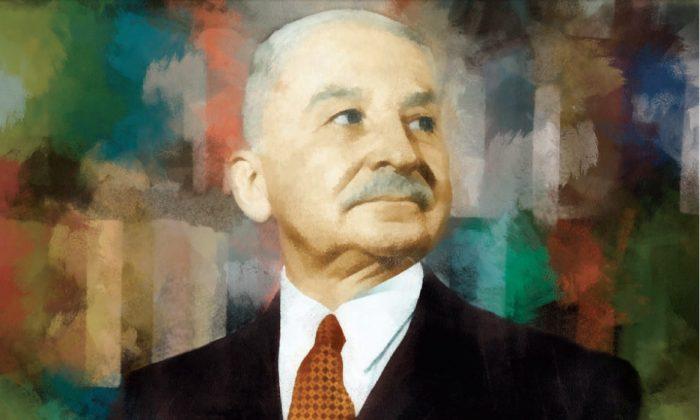“If you care about your country,” he said, “read Ludwig von Mises and the six lessons of the Austrian economic school, people.”
Okay, his actual language was a bit saltier than that but I’m quoting the gist.
Within the large literary legacy of Mises, this small book occupies an interesting place, mainly because he did not write it. It is his wife’s transcription of a series of lectures delivered in Buenos Aires, Argentina, in 1959. He was 78 years old, having lived through all the wars and depressions of the 20th century, while holding professional positions in Vienna, Geneva, and New York.
His audience on this occasion was young students and business professionals. At the end of his career and facing an audience that likely knew little of economic theory, he was inspired to speak as plainly as possible with homespun examples and plain language. He very likely could not have imagined that the results would end up as his most popular writing, much less having been promoted in 2024 by a UFC fight on global television!
So, what are these six lessons?
To Mises, it was not enough to concede private ownership in the things you buy to consume. A peaceful and prosperous society must also grant security to those who peacefully accumulate more capital, which are the produced means of production, which in turn are invested to build out supply chains and factories.
Only with private capital can a society advance with more division of labor, higher order and a more complex production process over time, and sustain a growing and prosperous society over time. A consistent mark of every poor society is a lack of security in capital, usually because successful businesses are pillaged by elites, stopping the development of complex structures of production.
In a market order properly called capitalism, its most essential feature is competition in the service of others. Mises isolates this as the revolutionary principle of marketing: capitalism turned attention to the common man.
“The development of capitalism consists in everyone’s having the right to serve the customer better and/or more cheaply,” he writes. “And this method, this principle, has, within a comparatively short time, transformed the whole world. It has made possible an unprecedented increase in world population.”
Can the concept of capitalism be abused? YES! Not everything called that is that. And just because a government proclaims to be devoted to capitalism doesn’t mean that it is. Governments most commonly betray the system in combination with large businesses to strangle competition and create cartels. The point of capitalism was to demolish the privileges of feudal societies and business guilds but they keep returning in various ways, among which our current global corporatism.
Mises in these lectures is very clear about what he regards as socialism, not some vague aspiration for the good of all but rather the valorization of statist controls against the freedom of enterprise. “[T]here is only one economic authority, and it has the right to determine all matters concerning production.” Further: “[I]n the socialist system everything depends on the wisdom, the talents, and the gifts of those people who form the supreme authority. That which the supreme dictator—or his committee—does not know, is not taken into account. But the knowledge which mankind has accumulated in its long history is not acquired by everyone; we have accumulated such an enormous amount of scientific and technical knowledge over the centuries that it is humanly impossible for one individual to know all these things, even though he be a most gifted man.”
Socialism fails on one fundamental fact. A functioning economic system relies on the ability to calculate profit and loss in order for rational decision-making to emerge. This system is what signals producers and consumers about how to use resources. When those signals are gone, everyone is just making things up and chaos emerges. Socialism imagines getting rid of capital markets but in doing so, it destroys the ability to make calculations over how best to deploy resources in the service of all.
So, Mises argues, as an economic system, it is an enormous flop.
“The government wants to interfere in order to force businessmen to conduct their affairs in a different way than they would have chosen if they had obeyed only the consumers. Thus, all the measures of interventionism by the government are directed toward restricting the supremacy of consumers. The government wants to arrogate to itself the power, or at least a part of the power, which, in the free market economy, is in the hands of the consumers.”
It should go without saying that lockdowns are the ultimate attack on private enterprise and a grotesque form of violent interventionism. But there are many other forms we take for granted such as central banking, agency control which is invariably captured by business interests, and health and safety regulations which seem to make sense until you realize that they all presume a level of intelligence of the government that exceeds that of the population.
“If the supply of caviar were as plentiful as the supply of potatoes, the price of caviar—that is, the exchange ratio between caviar and money or caviar and other commodities—would change considerably. In that case, one could obtain caviar at a much smaller sacrifice than is required today. Likewise, if the quantity of money is increased, the purchasing power of the monetary unit decreases, and the quantity of goods that can be obtained for one unit of this money decreases also.”
Boom. That’s it. That’s the reason for what we call inflation.
Mises further explains the trouble with such notions as the “price level.” In the real world, there is no such thing. It is a statistical artifact. Under inflationary conditions, some prices are always moving faster than others, and different groups benefit.
Example: “When the government inflates in order to wage a war, it has to buy munitions, and the first to get the additional money are the munitions industries and the workers within these industries. These groups are now in a very favorable position. They have higher profits and higher wages; their business is moving. Why? Because they were the first to receive the additional money. And having now more money at their disposal, they are buying. And they are buying from other people who are manufacturing and selling the commodities that these munitions makers want.”
We of course are living through another big inflation now, mostly caused by the money printing to make lockdowns possible and spread a fake prosperity through society. For this reason, this comment by Mises stands out: “[U]nder inflationary conditions, people acquire the habit of looking upon the government as an institution with limitless means at its disposal: the state, the government, can do anything.”
Of course this is newly controversial in our times, as both the right and left seem to agree that foreign production and trade injures domestic production. But Mises says that is completely untrue. In fact, he says, it was precisely foreign and international cooperation that fully emerged only in the 19th century that contributed so much to the world’s standard of living.
So, yes, Mises strongly defended free trade and sees no real good coming from a policy that taxes it and restricts it. Speaking in 1957, this was not a particularly controversial position. In the postwar period, there was wide agreement around the world that free trade and low tariffs were a key to peace and prosperity for all. For a variety of reasons, this has completely changed and now protectionism and national restriction has become the new norm.
“In the center of Europe, there is a small country, Switzerland, which nature has endowed very poorly. It has no coal mines, no minerals, and no natural resources. But its people, over the centuries, have continually pursued a capitalistic policy. They have developed the highest standard of living in continental Europe, and their country ranks as one of the world’s great centers of civilization. I do not see why a country such as Argentina—which is much larger than Switzerland both in population and in size—should not attain the same high standard of living after some years of good policies. But—as I pointed out—the policies must be good.”
Mises covers the 19th century and its optimism and ominously warns about the returning of dictatorship and war: “During the nineteenth century, there was a period when wars decreased in both number and severity. But the twentieth century brought a resurgence of the warlike spirit, and we can fairly well say that we may not yet be at the end of the trials through which mankind will have to go.”
How to combat this?
“Ideas and only ideas can light the darkness. These ideas must be brought to the public in such a way that they persuade people. We must convince them that these ideas are the right ideas and not the wrong ones. The great age of the nineteenth century, the great achievements of capitalism, were the result of the ideas of the classical economists, of Adam Smith and David Ricardo, of Bastiat and others.”
“What we need is nothing else than to substitute better ideas for bad ideas. This, I hope and am confident, will be done by the rising generation. Our civilization is not doomed, as Spengler and Toynbee tell us. Our civilization will not be conquered by the spirit of Moscow. Our civilization will and must survive. And it will survive through better ideas than those which now govern most of the world today, and these better ideas will be developed by the rising generation.”
This nice book is not the be-all and end-all of Mises’s work, much less the totality of crucial thought on economics and politics. But it is an excellent beginning, which is the source of its popularity. Hey, and perhaps Renato Moicano is right: download it, reflect on it, and go forward newly informed on the dangers of all forms of control over the freedom of the people.
If he were writing this book today, in light of current events, I have no doubt that it would be more focused on issues like the Great Reset, the Green New Deal, corporatist planning and pharma, medical monopolies, global government control, the forced financialization of so many Western economies, the rise of statism in the form of pandemic and energy planning, and so on.
These are the core issues today. Mises would certainly see this. After all, he lived through ghastly times and saw every iteration of evil. He was the historian of decline but also the prophet of the way out.







